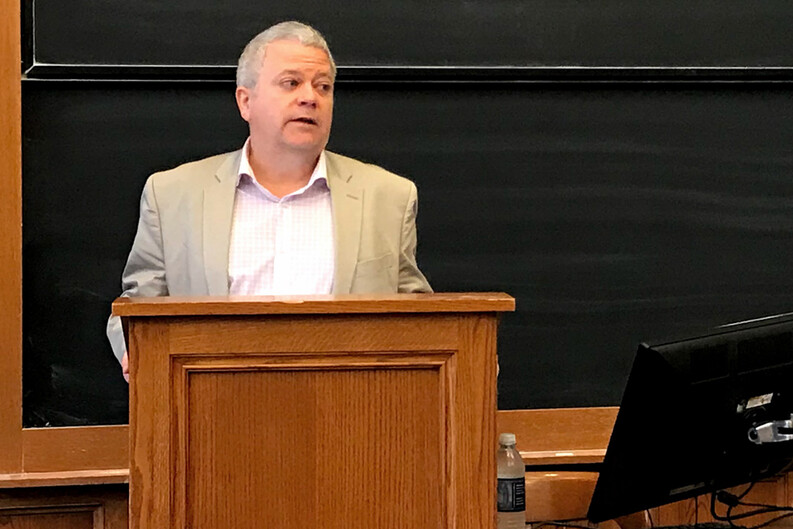Ronald Slye ’89 Tells his Insider Story of the Kenyan Truth, Justice & Reconciliation Commission

Professor Ron Slye ’89 was one of just three international commissioners for the Kenyan Truth, Justice and Reconciliation Commission (TJRC). Now, he is telling his story in a new book, The Kenyan TJRC: An Outsider’s View from the Inside, which he presented at Yale Law School on September 11, 2018.
Slye, a Professor of Law at Seattle University School of Law and the former associate director of the Schell Center, was selected by Kofi Annan to be a part of the commission because of his extensive experience in international criminal law, human rights, and transitional justice. For instance, Slye served as a legal consultant to the South African Truth and Reconciliation Commission from 1996 to 1997.
In Slye’s words, the TJRC was established to “understand what in Kenya’s history had led to the disputed 2007 election almost devolving into genocide or mass atrocity.” As Slye recounted, after the election, hundreds of people were killed by police in protests staged by supporters of the opposition candidate, Raila Odinga. Many members of the elected president Mwai Kibaki’s ethnic group, the Kikuyu people, were also targeted and killed. After months of conflict, Kofi Annan successfully negotiated a power-sharing agreement between Kibaki and Odinga’s parties and helped set up the TJRC.
The TJRC, which was made up of six Kenyan and three international commissioners, had an unprecedentedly broad mandate. To avoid the failure of other commissions to analyze underlying issues that led to conflict, the TJRC was responsible for investigating not only the post-election violence, but also land disputes, corruption, and economic marginalization in Kenya. Slye praised the mandate’s ambitiousness, but noted that it was difficult for the commission to do justice to all the areas it was meant to investigate.
Slye counted the record number of people who participated in its hearings and other public activities among the TJRC’s successes. He also lauded the TJRC’s special unit that focused on outreach to women and minority groups; the unit organized women’s town hall meetings in locations all over the country.
However, Slye also acknowledged that the TJRC had many shortcomings. He argued that the TJRC was too dependent on funding from the Kenyan government, which often blocked it from obtaining documents or other evidence. In addition, there was insufficient political will to implement the TJRC’s recommendations, such as reparations for victims. Slye even threatened to leave the TJRC over one of its failings: the commission never fully severed ties with its onetime chairman Bethwel Kiplagat, who was implicated in the 1984 Wagalla Massacre of ethnic Somalis by the Kenyan military in a remote area of Kenya.
Slye emphasized the lessons future commissions and other transitional justice processes can learn from the TJRC’s mistakes. “You have to make sure your commissioners are individuals with integrity,” he stressed. He also urged future commissions to remain politically independent. “Truth commissions need to do a lot to build a public movement around their work and their findings,” he added, explaining that broad support for commissions and the will to pressure governments is the only way that commissions will be meaningful.
Ultimately, Slye defended the value of truth and reconciliation commissions like the TJRC. When asked whether the TJRC’s goals of achieving truth, justice, and reconciliation were too ambitious or likely to conflict with one another, Slye said that these aspirational goals “can be in tension, but they can also complement one another.” He concluded, “You can’t have reconciliation without some sort of justice, and you can’t have justice without some sort of truth. How you make that happen in practice is another matter.”


